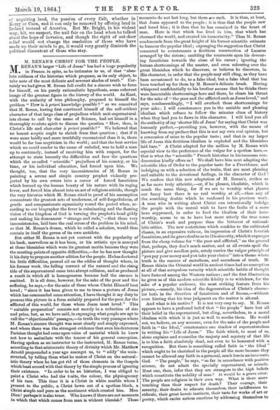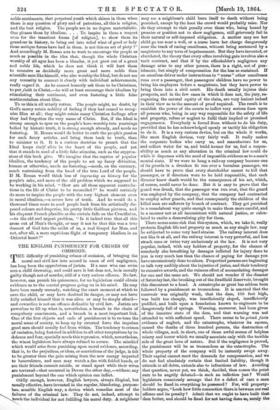M. RENAN'S CHRIST FOR THE PEOPLE. RENAN'S larger "Life of
Jesus" has had a huge popularity
But either M. Renan is not yet content with the popularity of his book, marvellous as it has been, or his artistic eye is annoyed at those blemishes which were its greatest merits because they were the meeting-points of opposite difficulties,—for he has now thought it his duty to prepare another edition for the people. He has doctored his little difficulties, poured oil on the eddies of thought where, in his former work, the falling current of the natural and the rising tide of the supernatural came into abrupt collision, and so produced a result in which all is homogeneous because half the essence is omitted. It is all done, however, for the sake of the poor and the suffering, he says,—for the sake of those whom Christ Himself best loved ; "since it has been given to me to trace a picture of Jesus which has commanded some attention, I have thought it my duty to present this picture in a form suitably prepared for the poor, for the afflicted of this world, for those whom Jesus most loved." This " suitable preparation" consists not merely in a reduction of size and price, but, as we have said, in expunging what people are apt to call the " objectionable" passages,—in truth the very passages where M. Renan's sincere thought was most clearly and simply expressed, and where there was the strongest evidence that even his dexterous Parisian thought had come upon veins of material which he knew not how to assimilate with the tenour of his general conception. Having spoken as an instructor to the instructed, M. Renan turns, according to that aristocratic theory of divinity which Mr. Matthew Arnold propounded a year ago amongst us, to " edify" the unin- structed, by telling them what he makes of Christ on the natural- istic theory when he has got rid of those elements in the Gospels which least accord with that theory by the simple process of ignoring their existence. "In order to be an historian, I was obliged to paint a Christ who had the traits, the colour, the physiognomy of his race. This time it is a Christ in white marble whom I present to the public, a Christ hewn out of a spotless block, a Christ simple and pure as the sentiment which created him. Mon Dien! perhaps it is also triter. Who knows if there are not moments in which that which comes from man is without blemish? These And what is his motive ? It is not very easy to say. M. Renan appears to have a profound belief that " the people " have lost all their belief in the supernatural, but cling, nevertheless, to a moral idealism with which it is just as well to soothe them. He would not, we believe, on any account, even for the sake of the people and faith in " the Ideal," countenance one shadow of supernaturalism in writing his "Life of Jesus." The faith which, to most of us, alone explains and reconciles the majesty and mystery of that life is to him a faith absolutely dead, not even to be honoured with a recognition. But there is something called faith in " the Ideal " which ought to be cherished in the people all the more because they cannot be allowed any faith in a personal, much less in an incarnate, God. " The people," he says, "so far in accordance with positive science, do not admit the specially supernatural, or miracle. Must one, then, infer that they are strangers to the high beliefs which constitute the nobility of man? It would be a grave error. The people are religious in their own way. What is there more touching than their respect for death? Their courage, their i serenity, their desire to educate themselves, their indifference to ridicule, their great heroic instincts, their taste for works of art or poetry, which excite serious emotions by addressing themselves to noble sentiments, that perpetual youth which shines in them when there is any question of glory and of patrotism, all this is religion, and the best religion. The people are in no degree materialistic. One pleases them by idealism. . . . To inspire in them a respect even for the transient forms [of religion], to show them its grandeur in history, to bring out into relief what of good or holy these antique forms have had in them, is not this an act of piety ?'' And accordingly M. Renan sets to work to encourage the people as much as possible in the idea that, though the whole Christian worship of all ages has been a blunder, it yet grew out of a great and noble life, which he does not think it will hurt them to conceive as decidedly more great and more noble than scientific men like himself, who also worship the Ideal, but do not see any necessity to connect it closely with individual achievements, really regard it. As he cannot honestly ask them to be Christians, to put faith in Christ,—be will at least encourage their idealism by stimulating their sentiment, and even fostering a little false sentimentalism about Him.
To us this is all utterly rotten. The people might, no doubt, by God's mercy retain nobility of feeling if they had ceased to recog- nize Him at all ; they might retain many Christian feelings after they had forgotten the very name of Christ. But, if the Ideal is strong enough to spur on the people's hero-worship into yearnings belied by historic truth, it is strong enough already, and needs no fostering. M. Renan would do better to curb the people's passion for such fancy articles, and bring them back to truth, than to minister to it. It is a curious doctrine to preach that the Ideal keeps itself alive in the heart of the people, and yet that it stands in need of a little false stimulus, such as the suppres- sions of this book give. We imagine that the caprice of popular idealism, the tendency of the people to set up fancy divinities, human or otherwise, needs no fostering,—needs, on the contrary, much restraining from the hand of the true Lord of the people. If M. Renan would think less of improving on history for the people's sake, and more of the old problem which we supposed to be working in his mind, " How are all these apparent contradic- tions in the life of Christ to be reconciled ?" he would certainly do more to inspire the people with the very highest element even in moral idealism,—a severe love of truth. And he would do a thousand times more to send people back from his artistically dis- posed colours and draperies, his pretty little Galilean pictures, and his eloquent French plaudits as the curtain falls on the Crucifixion, —to the old and urgent problem, " Is it indeed true that all this arose out of Man's thought, or may it not be that this was a true descent of God into the midst of us, a real Gospel for Man, and not, after all, a mere capricious flight of temporary idealism in an "-Oriental heart ?"



































 Previous page
Previous page